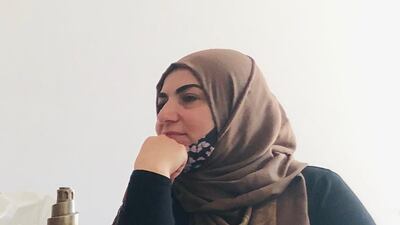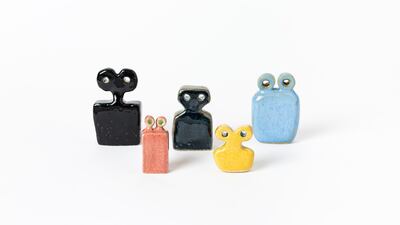"Your parents leave a place, and somehow you have this deep connection to it – even if you've never been there, or you don't quite understand it," says artist Rand Abdul Jabbar about her latest project, Every Act of Recognition Alters What Survives, which looks at generations of diaspora.
"You're always feeling somewhere in between. It was getting to that 'in between' – and opening up that conversation to other voices to see how they think about it – that allows you to start making sense of your own experience," she says.
The Baghdad-born artist, who lives in Abu Dhabi, is developing her new work for Shubbak, a biennial festival of theatre and performance by Arab artists held in London. The event will return to the UK capital this year; however, dates are yet to be announced.
Abdul Jabbar's ongoing research project draws on her own past and asks what it has in common with women who left their home countries at different stages of their lives – or who have never even been there.
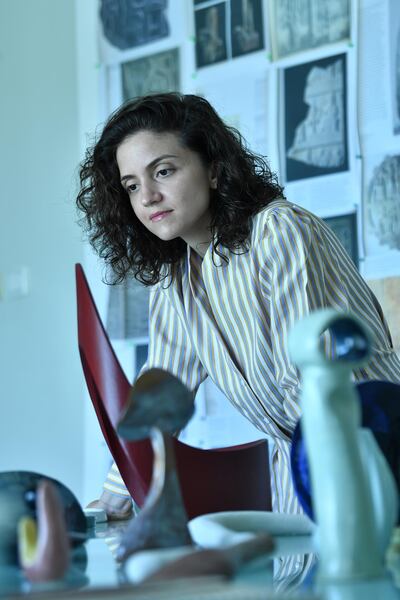
Last summer, in collaboration with the London art and community organisation Grand Junction, as well as the Iraqi Association charity, she invited about 30 women living in the UK, of Iraqi, Syrian and Moroccan heritage, to a series of workshops. She asked each participant to bring an object of sentimental value. They were instructed to explore the mementoes for their material properties, in activities such as sketching and blind contour drawing, when you sketch a continuous outline of a piece without looking at the paper. Over the weeks, the objects opened up stories from the women's past.
"Oftentimes our history is written by others," says Abdul Jabbar. "And it's a history of war and violence because the media representation of Iraq doesn't reflect our own experiences. The intention here was to take ownership of those narratives. It's about a legacy: that's why it's called 'Every Act of Recognition Alters What Survives'. It's about what you leave behind and how you contribute to the narrative around you."
One woman, Maha, brought what she called her "book of memories", in which she had for years noted down the recipes from the dishes served at the Baghdad social gatherings she'd attended. Another, Maysoun, from Iraq, brought a handwoven orange, yellow and red jodaliyyah, or blanket, that had been passed down through generations as a wedding gift, and was given to her by her mother when she was a bride. Shezza, from Syria, showed a set of small glass turtles that she had as a child; a species that carries its home on its back. They were one of the few things she packed when she left her home country.
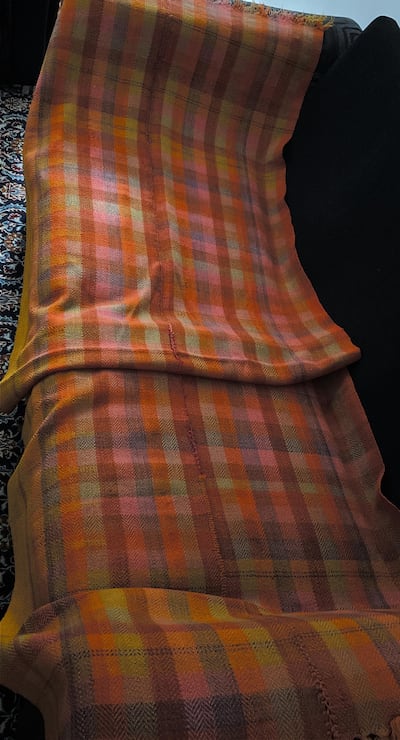
Abdul Jabber says a spirit of trust developed among the women, who contributed to the discussions via Zoom from their homes. Some knew each other from before, there was a mother-and-daughter pair, and a core group emerged over the weeks of the workshops, allowing the women to delve into their pasts.
One Iraqi woman, Souad, showed a slightly rustic brass coin box from Al Rafidain Bank. The structure is a replica of the famous twisted minaret at the Malwiya mosque in Samarra, about 125 kilometres north of Baghdad. "Before I started this project, this … was merely a decorative item on my windowsill," she says in the text about the work on its website. "Now that I have allowed myself to think about all aspects of this object, my memories and feelings have started to erupt inside my head like a volcano. It feels as if my memories were bottled up in a soda bottle and now that I have shaken it, they have started to spill everywhere."
The coin box was given to her by her former sister-in-law, on the last occasion when the two saw each other. She had associated it with that fraught meeting, but now gives it a happier shade: her memory of when she climbed the minaret with her family as a girl in the late 1970s. She, her sister and her sister’s friends reached the top of the 52-metre ziggurat just as the sun was about to go down, and looked out over the rest of her family picnicking on a rug below.
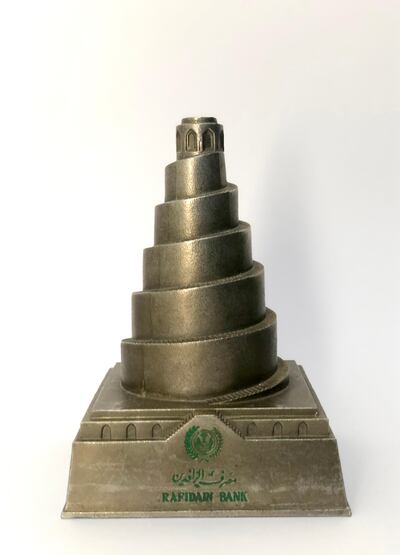
In her sculptures, Abdul Jabbar also considers how material objects bear memory. She trained as an architect in Canada and the US, and transitioned to an art practice when she returned to the UAE after her studies.
She is best known for Earthly Wonders, Celestial Beings (2019–ongoing), a series of small, glossy ceramics inspired by Mesopotamian artefacts.
Perfect circles, for example, evoke the alert, frontal-facing eyes of Sumerian statuary, but the ceramics also evince a strangeness with origins impossible to pinpoint. Poised midway between utility and figuration, they fit neither category fully, as if our imagination of what these items are, or might have been used for, is out of step with the objects themselves.
In making them, the artist says they refer not only to Iraq's Mesopotamian past, but also to the ceramics that her parents had as decorative objects in the houses in which she grew up, in Abu Dhabi, Dubai and Canada. Every Act of Recognition leans into this biographical aspect of Abdul Jabbar's work, while retaining the idea of time being a-linear, or varying in how it affects different subjects.
Longing, loss and material reminiscences are familiar approaches to the representation of diaspora, but this project pays close attention to generational distinctions. The women in the group ranged in ages from teens to those in their late sixties, and framed their emotional experiences of diaspora differently.
“The older group was saying that we wanted to shelter our children from our pain,” says Abdul Jabbar. “That we tried our best to protect them, but sometimes it was out of our hands, like when we’d be calling our family back home or watching the news. As much as they tried to shield their children, things pass through, and they felt a sort of guilt about that. Meanwhile, the younger generation was saying: ‘You didn’t have to try to pass on that guilt; it wasn’t something intentional. I felt your pain. I saw it in your eyes. I saw it in the way you behaved.’”
The summer workshops were the first phase of a multi-part project that will conclude during Shubbak. The final shape for the performance and installations is yet to be determined, but the women's stories have already gone online, in recordings and text in Arabic and English. "These are universal stories," says Abdul Jabbar.
“There’s always this feeling of being other [in the diaspora], but these narratives are shared human experiences – passing on your language or creating rituals around a dish you have fond memories of. These are everyday experiences, regardless of your diasporic experience or where you come from. The project is about adding a bit more of layered complexity to the way we approached that part of the world and the people that come from it.”
More information is at www.actsofrecognition.com and www.shubbak.co.uk
